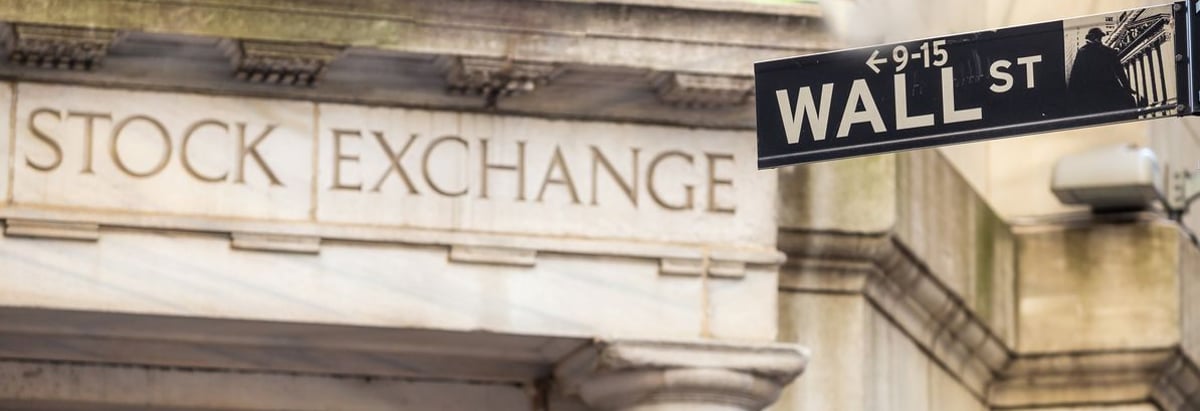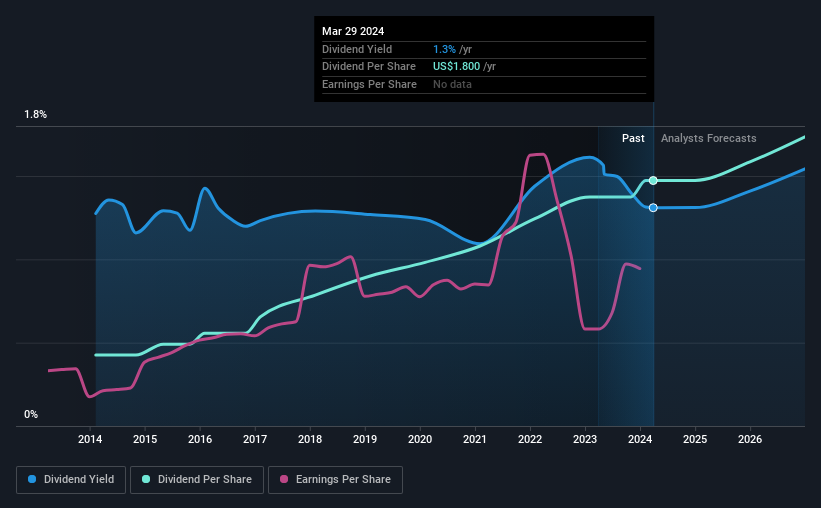- United States
- /
- Capital Markets
- /
- NYSE:ICE
Intercontinental Exchange (NYSE:ICE) Will Pay A Dividend Of $0.45

Intercontinental Exchange, Inc. (NYSE:ICE) has announced that it will pay a dividend of $0.45 per share on the 28th of June. Even though the dividend went up, the yield is still quite low at only 1.3%.
Check out our latest analysis for Intercontinental Exchange
Intercontinental Exchange's Earnings Easily Cover The Distributions
The dividend yield is a little bit low, but sustainability of the payments is also an important part of evaluating an income stock. Based on the last payment, Intercontinental Exchange was quite comfortably earning enough to cover the dividend. This indicates that a lot of the earnings are being reinvested into the business, with the aim of fueling growth.
Over the next year, EPS is forecast to expand by 41.6%. If the dividend continues along recent trends, we estimate the payout ratio will be 34%, which is in the range that makes us comfortable with the sustainability of the dividend.

Intercontinental Exchange Has A Solid Track Record
The company has an extended history of paying stable dividends. Since 2014, the annual payment back then was $0.52, compared to the most recent full-year payment of $1.80. This implies that the company grew its distributions at a yearly rate of about 13% over that duration. It is good to see that there has been strong dividend growth, and that there haven't been any cuts for a long time.
Intercontinental Exchange May Find It Hard To Grow The Dividend
Investors could be attracted to the stock based on the quality of its payment history. Earnings have grown at around 3.6% a year for the past five years, which isn't massive but still better than seeing them shrink. The company has been growing at a pretty soft 3.6% per annum, and is paying out quite a lot of its earnings to shareholders. This isn't necessarily bad, but we wouldn't expect rapid dividend growth in the future.
Intercontinental Exchange Looks Like A Great Dividend Stock
In summary, it is always positive to see the dividend being increased, and we are particularly pleased with its overall sustainability. Distributions are quite easily covered by earnings, which are also being converted to cash flows. All in all, this checks a lot of the boxes we look for when choosing an income stock.
It's important to note that companies having a consistent dividend policy will generate greater investor confidence than those having an erratic one. Meanwhile, despite the importance of dividend payments, they are not the only factors our readers should know when assessing a company. Just as an example, we've come across 2 warning signs for Intercontinental Exchange you should be aware of, and 1 of them makes us a bit uncomfortable. Is Intercontinental Exchange not quite the opportunity you were looking for? Why not check out our selection of top dividend stocks.
New: AI Stock Screener & Alerts
Our new AI Stock Screener scans the market every day to uncover opportunities.
• Dividend Powerhouses (3%+ Yield)
• Undervalued Small Caps with Insider Buying
• High growth Tech and AI Companies
Or build your own from over 50 metrics.
Have feedback on this article? Concerned about the content? Get in touch with us directly. Alternatively, email editorial-team (at) simplywallst.com.
This article by Simply Wall St is general in nature. We provide commentary based on historical data and analyst forecasts only using an unbiased methodology and our articles are not intended to be financial advice. It does not constitute a recommendation to buy or sell any stock, and does not take account of your objectives, or your financial situation. We aim to bring you long-term focused analysis driven by fundamental data. Note that our analysis may not factor in the latest price-sensitive company announcements or qualitative material. Simply Wall St has no position in any stocks mentioned.
About NYSE:ICE
Intercontinental Exchange
Engages in the provision of market infrastructure, data services, and technology solutions for financial institutions, corporations, and government entities in the United States, the United Kingdom, the European Union, Singapore, India, Abu Dhabi, Israel, and Canada.
Average dividend payer with mediocre balance sheet.

